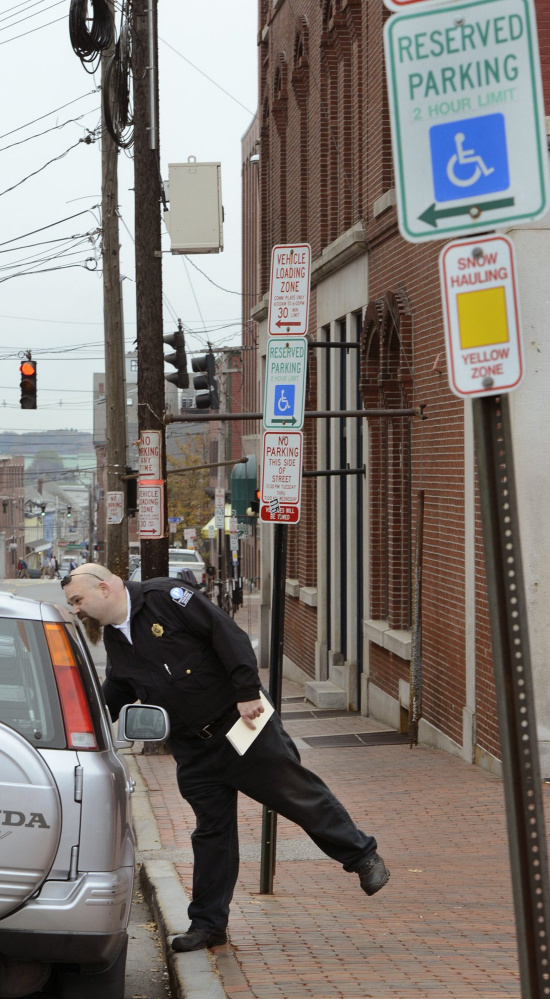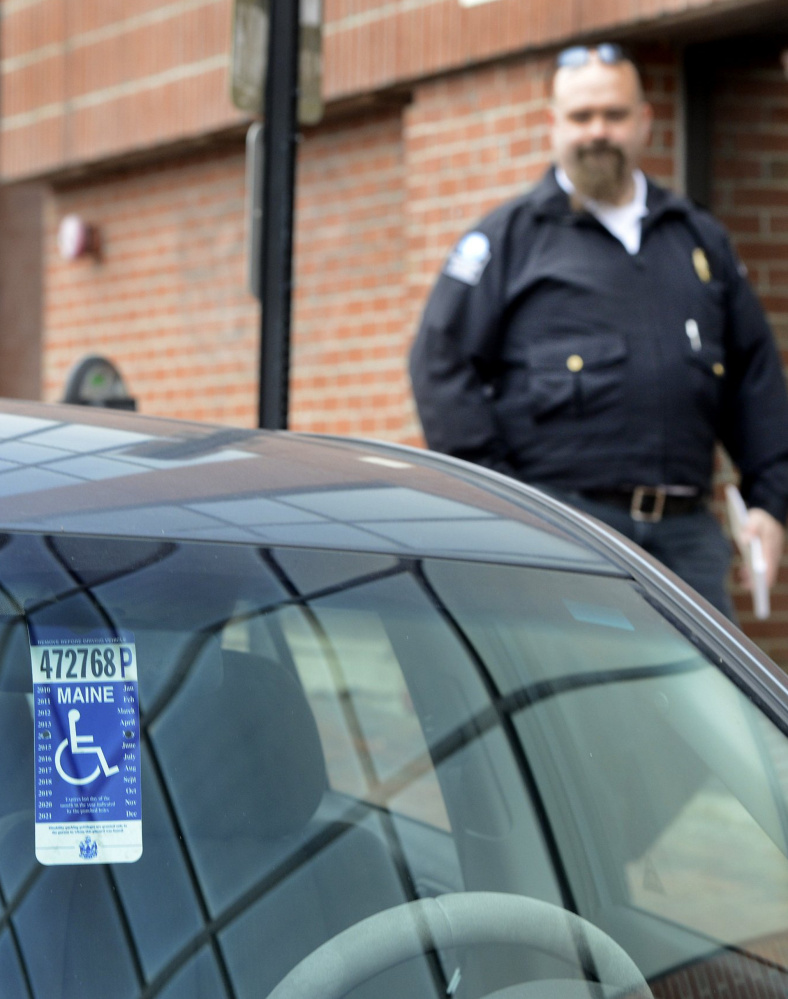They are, in a word, jerks.
Like the rest of us, they have trouble finding a parking space in busy downtown Portland.
But unlike the rest of us, they see nothing wrong with pulling into a handicapped space “just for a minute” because, you know, it’s empty and because, you know, it’s not really hurting anyone.
“They don’t think they’re doing anything wrong,” Peter Cohen said this week amid the late-morning din of an Old Port coffee shop. “So I become a little bit annoyed about that. It really bothers me.”
Cohen, a 52-year-old, non-practicing attorney from Cape Elizabeth, has a disability.
It’s called dystonia, a neurological disorder that causes repeated and uncontrolled muscle contractions and often leaves its victims painfully contorted and unable to get around without tremendous difficulty.
Back in 2003, Cohen underwent Deep Brain Stimulation, a then-revolutionary surgical procedure during which the patient lies awake for hours while doctors implant a pacemaker in the chest and run electrical lead wires to the brain.
The operation, performed at Emory University Hospital in Atlanta, worked like a charm. Cohen’s once-severe symptoms have diminished to the point where most of the contractions are gone, he can stand up straight, walk, drive a car and generally love life far more than he did before.
But he still knows what it’s like to live day in and day out with a disability. And as Portland descends into another marathon of snow and ice and all the limited mobility that comes with it, Cohen is on a dual mission:
First, he wants to increase the number of handicapped parking spaces in high-traffic areas like the Old Port and Congress Street.
Second, he strongly suggests we leave those spots open for the people who truly need them.
According to Jessica Grondin, the city’s director of communications, Portland sets aside just under 150 on-street spaces for handicapped parking citywide – out of approximately 6,400 controlled spaces.
That’s just over 2 percent, she noted, which is in line with the number of handicapped spaces required under the federal Americans with Disabilities Act for big-box store lots, parking garages and other off-street locations.
Go to a Wal-Mart and you’ll see those spaces clustered right where they should be: directly in front of the store entrance.
Not so in downtown Portland, counters Cohen.
“Overall, there are a very few handicapped spots in the downtown or the Old Port,” he said. Worse yet, he noted, several of those have been cut off in recent weeks by construction projects or used by city plow operators to pile snow before its removal.
“Freedom of movement is a fundamental desire of all of us,” Cohen said. “Sometimes finding a handicapped accessible parking space can make the difference between staying home and getting out.”
To be fair, Grondin also noted that under state law, people with handicapped plates or windshield placards can park free of charge at any metered or time-limited spot for up to double the posted time limit.
True, concedes Cohen. But when all of those spaces are full, as they most often are during the business day, the free-parking provision gets people with disabilities no closer to where they want to go.
“For one with a mobility issue, the prospect of parking in a regular spot and having to then travel by foot or wheelchair a significant distance is daunting and is oftentimes functionally impossible for them in the first place,” he said. “And obviously this mobility issue is worsened many times over by winter snow and ice.”
Cohen’s solution? More spaces spread out more strategically throughout high-traffic locations like lower Exchange Street and the streets surrounding One City Center, where there are none.
(Echoing that sentiment is the United States Access Board, which develops regulations and standards for compliance with the Americans with Disabilities Act. It has proposed a rule mandating that new or reconfigured city streets contain at least one handicapped space per block.)
As Kristin Aiello, managing attorney for Disability Rights Maine, put it in an interview Thursday, “It’s cold comfort to say, ‘We have 150 spaces’ if none of them are in a place where people need and want to access.”
Then there’s the hijacking of those handicapped spaces that do exist. Also known as the jerk factor.
Cohen said it’s worst on weekdays around 5 p.m., when the comings and goings peak downtown and handicapped spaces become live-parking havens for able-bodied people with inexcusable blind spots.
“It does not matter though how long one is parked illegally – the lawbreaker is denying rightful access to disabled Mainers who truly need the handicapped parking spot,” Cohen said. “One is still breaking Maine state law whether you’re in the spot illegally for 30 seconds or two hours.”
On this point, Cohen and City Hall fully agree.
According to Grondin, 800 summonses were handed out in the past year to people parked illegally in handicapped spaces. Each carried a $200 fine.
The worst of the offenders?
“People who do not have a disability but park in the spaces using someone else’s permit or plate, i.e., borrowing from a relative,” Grondin noted.
Cohen, who has a handicapped-parking permit but rarely uses it out of concern for those who need the space more than he does, knows the imposter syndrome all too well.
In March he went on a date with a woman in the Old Port. When it was over, he gallantly walked her back to her car.
“It was parked in a handicapped space,” he recalled.
Sure enough, she had a placard hanging from her mirror. Problem was it belonged to the elderly woman for whom she worked. An elderly woman who, for the record, was nowhere in sight.
“I was in a rush to meet you, Peter!” the date hastily explained.
A stunned Cohen bade her farewell.
Forever.
Bill Nemitz can be contacted at:
bnemitz@pressherald.com
Send questions/comments to the editors.




